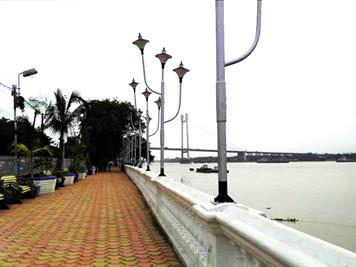Kolkata & Nature (প্রাকৃতিক কলকাতা)
….. (1 day)
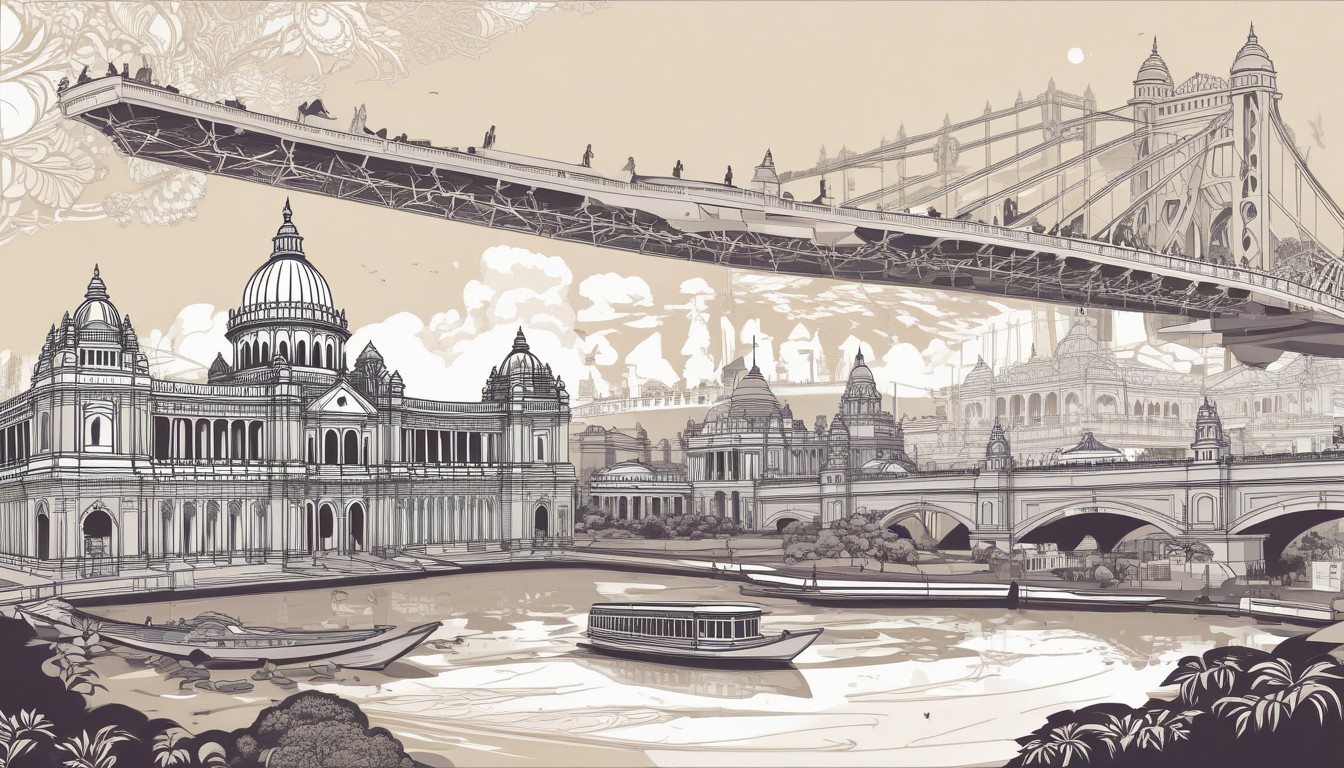
The Acharya Jagadish Chandra Bose Indian Botanic Garden, formerly known as the Indian Botanic Garden and the Calcutta Botanic Garden, stands as a remarkable botanical haven situated in Shibpur, Howrah, near Kolkata. Commonly referred to as the Calcutta Botanical Garden and previously recognized as the Royal Botanic Garden, Calcutta, this expansive garden is a treasure trove of botanical diversity. The garden showcases a vast array of rare plants, boasting a collection of over 12,000 specimens spread across 109 hectares. Managed by the Botanical Survey of India (BSI) under the Ministry of Environment and Forests, Government of India, it serves as a hub for botanical research and conservation.
A botanic garden, often likened to an open museum of living plant collections, meticulously organizes trees, shrubs, herbs, climbers, and lianas. The plants are scientifically arranged and labeled based on internationally accepted classifications, while closely related species are cultivated together for a comprehensive understanding of plant life. Various sections within the Botanic Garden are dedicated to specific plant groups, such as the Arboretum for trees, Pinetum for gymnosperms like pine trees, Pandanetum for Screwpines (Pandanus), Orchidarium for orchids, Bambusetum for bamboo, and Palmetum for palms.
For visitors with a genuine interest in plants, a trip to a botanic garden provides insight into the fascinating world of plant diversity. The gardens act as open natural laboratories, offering a conducive environment for botanists, horticulturists, plant breeders, geneticists, evolutionary biologists, palynologists, conservationists, environmental scientists, and other researchers. These professionals have the opportunity to study multiple aspects of plant biology within the unique and controlled setting of the botanic garden.
In essence, the Acharya Jagadish Chandra Bose Indian Botanic Garden serves as a living testament to the richness and complexity of the plant kingdom. Beyond its role as a picturesque attraction, it stands as a vital center for education, research, and conservation, contributing significantly to our understanding and appreciation of the natural world.
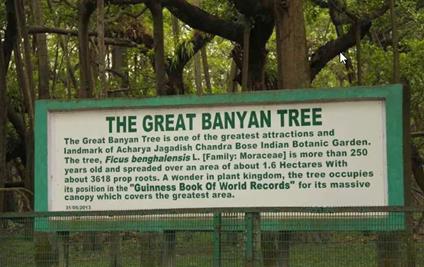
A botanic garden, often likened to an open museum of living plant collections, meticulously organizes trees, shrubs, herbs, climbers, and lianas. The plants are scientifically arranged and labeled based on internationally accepted classifications, while closely related species are cultivated together for a comprehensive understanding of plant life. Various sections within the Botanic Garden are dedicated to specific plant groups, such as the Arboretum for trees, Pinetum for gymnosperms like pine trees, Pandanetum for Screwpines (Pandanus), Orchidarium for orchids, Bambusetum for bamboo, and Palmetum for palms.
For visitors with a genuine interest in plants, a trip to a botanic garden provides insight into the fascinating world of plant diversity. The gardens act as open natural laboratories, offering a conducive environment for botanists, horticulturists, plant breeders, geneticists, evolutionary biologists, palynologists, conservationists, environmental scientists, and other researchers. These professionals have the opportunity to study multiple aspects of plant biology within the unique and controlled setting of the botanic garden.
In essence, the Acharya Jagadish Chandra Bose Indian Botanic Garden serves as a living testament to the richness and complexity of the plant kingdom. Beyond its role as a picturesque attraction, it stands as a vital center for education, research, and conservation, contributing significantly to our understanding and appreciation of the natural world.

Eden Gardens, located in Kolkata, India, is a historic international cricket stadium with a rich legacy. Established in 1864, it holds the distinction of being the oldest and second-largest cricket stadium in India, as well as the third-largest in the world. Currently boasting a capacity of 68,000 spectators, Eden Gardens has played a pivotal role in the history of cricket and has become an iconic venue for the sport.
Owned and operated by the Cricket Association of Bengal (CAB), Eden Gardens is renowned as the home ground of the Kolkata Knight Riders, a team in the Indian Premier League (IPL). Additionally, it serves as the headquarters of the Cricket Association of Bengal.
Often referred to as the “home of Indian cricket,” Eden Gardens holds a special place in the hearts of cricket enthusiasts. Its historical significance is underlined by the fact that it is the first purpose-built ground for the sport. The stadium’s grandeur and cultural importance have led to comparisons with the Colosseum, earning it the title of “cricket’s answer to the Colosseum.” Furthermore, it has been affectionately referred to as the “Mecca of Indian cricket,” highlighting its central role in the nation’s cricketing landscape.
Over the years, Eden Gardens has witnessed numerous iconic moments and historic matches, contributing to its reputation as one of the most revered cricket stadiums globally. Its expansive seating capacity and vibrant atmosphere during matches make it a truly unique and memorable venue for cricket fans around the world.
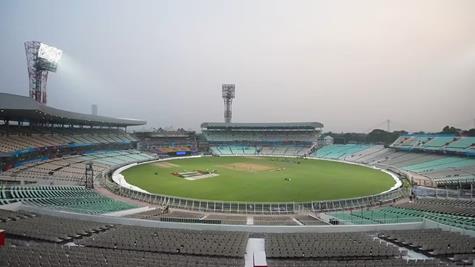
Owned and operated by the Cricket Association of Bengal (CAB), Eden Gardens is renowned as the home ground of the Kolkata Knight Riders, a team in the Indian Premier League (IPL). Additionally, it serves as the headquarters of the Cricket Association of Bengal.
Often referred to as the “home of Indian cricket,” Eden Gardens holds a special place in the hearts of cricket enthusiasts. Its historical significance is underlined by the fact that it is the first purpose-built ground for the sport. The stadium’s grandeur and cultural importance have led to comparisons with the Colosseum, earning it the title of “cricket’s answer to the Colosseum.” Furthermore, it has been affectionately referred to as the “Mecca of Indian cricket,” highlighting its central role in the nation’s cricketing landscape.
Over the years, Eden Gardens has witnessed numerous iconic moments and historic matches, contributing to its reputation as one of the most revered cricket stadiums globally. Its expansive seating capacity and vibrant atmosphere during matches make it a truly unique and memorable venue for cricket fans around the world.

Rabindra Sarobar, formerly known as Dhakuria Lake, is a prominent artificial lake, garden, and park located in South Kolkata, West Bengal, India. The name “Rabindra Sarobar” not only signifies the lake itself but also encompasses the entire area surrounding it. Positioned in a strategic location, the lake is bordered by Southern Avenue to the North, Shyamaprasad Mukherjee Road to the West, Dhakuria to the East, and the Kolkata Suburban Railway tracks to the South.
This picturesque location serves as a popular recreational spot for locals and visitors alike. The park around Rabindra Sarobar provides a serene escape from the hustle and bustle of city life, offering greenery, walking paths, and open spaces for leisure activities. The artificial lake enhances the natural beauty of the surroundings, creating a peaceful atmosphere.
Rabindra Sarobar is not only a place for relaxation but also a hub for cultural and recreational events. The area hosts various cultural programs, performances, and activities, making it a vibrant center for community engagement.
The lake and its surroundings play a significant role in the daily lives of residents, providing a tranquil environment for strolls, jogging, and other outdoor activities. It stands as a testament to the city’s commitment to preserving green spaces amid urban development, offering a harmonious blend of nature and recreation in the heart of Kolkata.
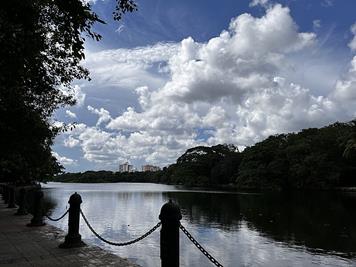
This picturesque location serves as a popular recreational spot for locals and visitors alike. The park around Rabindra Sarobar provides a serene escape from the hustle and bustle of city life, offering greenery, walking paths, and open spaces for leisure activities. The artificial lake enhances the natural beauty of the surroundings, creating a peaceful atmosphere.
Rabindra Sarobar is not only a place for relaxation but also a hub for cultural and recreational events. The area hosts various cultural programs, performances, and activities, making it a vibrant center for community engagement.
The lake and its surroundings play a significant role in the daily lives of residents, providing a tranquil environment for strolls, jogging, and other outdoor activities. It stands as a testament to the city’s commitment to preserving green spaces amid urban development, offering a harmonious blend of nature and recreation in the heart of Kolkata.


